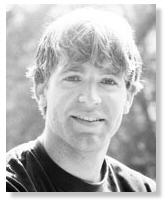
If Paraguay RPCV Toren Volkmann stays sober for three years, he could be allowed to return to the Peace Corps
One page at a time
DEBBIE CAFAZZO The News Tribune
Every parent dreads getting the phone call.
The one that tells you there's been a horrible accident. That something unthinkable has happened to your child.
But when the phone rang in Chris Volkmann's Olympia home last fall, it wasn't an emergency room nurse or a police officer calling with the bad news.
It was her 23-year-old son, Toren.
He was supposed to be working as a Peace Corps volunteer in South America. Instead, he was calling from Washington, D.C., to tell her he was entering a rehab program for his alcoholism.
At first, hearing that his problem was "only" with alcohol, she felt a false sense of relief. But it didn't last long.
"It hit me, that this could be serious," she said. "He's going to deal with this for the rest of his life."
The feelings of guilt and grief set in "before I hung up the receiver."
But Toren, finally relieved of the burden of years of denial and uncertainty about his problem, "felt about 1,000 pounds of pressure lifted off my back."
That first, difficult conversation began a mother-and-son dialogue that evolved into a book, "Our Drink: Detoxing the Perfect Family" ($19.95, Elton-Wolf Publishing). In it, the Volkmanns share of how alcohol addiction affected their family. "Our Drink" is their acronym (see accompanying story) for a set of reminders they hope will prompt families to discuss teen and young adult drinking openly and honestly.
Toren and his mother write distinctive chapters in the book, each using his or her own voice to makes readers feel their struggle. Much of Toren's writing flowed from the journals he kept during his six months in a halfway house.
Chris writes in the opening chapter:
"Friends and acquaintances joked about our family, how they couldn't stand us: the successful suburban medical family with three knock-'em-dead boys — athletic, smart, charismatic hunks with a strong work ethic and sensitivity …"
But despite outward appearances, "our son was killing himself in our presence, over several years' time, and we didn't see it."
Writes Toren: "I thought the problem with being an alcoholic was you just drank a lot. I did that just fine and things were great. No one ever said, 'Dude, you're gonna start losing your money, your memory and, above all, your longevity and tolerance …' as if just being (drunk) and happy every night weren't enough … and when you stop a mean bender you're going to be a fevering, shaky, paranoid half-wit for a day or two who can't think, sleep, even relax or eat until withdrawals are over." Both Chris, a stay-at-home mom and former teacher, and her husband, Don, an anesthesiologist whose hard work had bought them a spacious waterfront home on southern Puget Sound, thought they were doing everything right for their blond boys. For years, their lives revolved around sports, music lessons, community volunteering, backpacking and skiing, good grades and good colleges.
But until that phone call, no one saw Toren's alcohol consumption for what it was.
Toren, who recently moved back to Olympia from a job in New York to work with his mom promoting the book and speaking about his experience, remembers when his serious drinking career began. It was during his freshman year of high school.
"I did well at school and in sports," he remembered. "No one at that age would have said I would be an alcoholic."
Chris had lived through the growing-up of Toren's two older brothers, Tyson and Tanler. Like many parents, she had come to expect a certain amount of stepping out of line from teenaged boys.
But Chris was sure to sit her family down for dinner together every night "whether anyone wanted to or not." She was known as the strictest mother in middle school.
But none of it mattered, she writes: "Believe me, many fine drunks are nurtured in families who sit down jointly for dinner every night, read excellent literature together, make and enforce strict ground rules and emphasize ethics and morals. In fact, the quality of alcoholics produced in such a family is outstanding. I'm here to prove it."
She thought she was doing the right thing when she posted a chart about binge drinking from the American Medical Association in the family bathroom. The family even purchased its own Breathalyzer, the tool used by police officers to test drivers for intoxication. From time to time, the parents used it to examine their boys when they returned home from social events.
"I was thinking that this is my third kid," Chris said of Toren's high school years. "The others turned out well. He's making some bad decisions, but he'll probably pull out fine."
Those "bad decisions" included being caught drinking by police as a high school student, and coming home so intoxicated one night that he couldn't even offer the urine sample his parents wanted to test.
In addition to the community service handed out by the legal system and his expulsion from the school soccer team, Toren's parents made sure there were additional consequences, restricting access to the phone, friends and Nintendo. They took away his Beastie Boys concert tickets and met with the parents of his friends.
Did any of this have an effect?
"Back then, I wasn't going to listen to anybody," Toren writes. "I was young, ready to rock and didn't need advice."
By the time Toren went off to the University of San Diego, his parents thought he was finally ready to buckle down.
Instead, college — with all its freedom from adult supervision — turned out to be the place where Toren would perfect his addiction to alcohol.
Malt liquor was his beverage of choice.
He writes: "By week three or four, I had been written up three different times for alcohol violations and had several meetings with the RA (residence assistant) and RD (residence director). But screw them all. The rules were too strict; the RAs weren't fair and were going after or picking on certain people. I just had bad luck. I'd be damned if I was going to mellow out — this was college, for God's sake."
He was sent to Alcoholics Anonymous meetings, but he lied about attendance. He told his parents he had to go as part of a class — he was a psychology major, after all. He was told he could no longer live on campus.
But still, he managed to graduate with good grades. His parents never knew about all the trouble on campus.
"I worked hard but played harder," Toren remembers. "And it caught up with me."
It caught up with him, finally, at a conference for Peace Corps volunteers in Asuncion, Paraguay: "All I could think about was drinking when my system got low. I didn't consider it a craving: It was a physical necessity. … I had compromised everything for alcohol. It was my new priority."
Disgusted with himself, disgusted with the blackouts he was experiencing and with the lies he was having to tell to cover up for his wild behavior when he drank, he turned himself in to a Peace Corps nurse. After detoxing in a hotel room with some Peace Corps friends, he was on a flight to D.C. and rehab.
It was there that he learned there is a strong genetic link to alcoholism — that the tendency can run in families. And for the first time, he also learned from his father about the alcoholics in the family tree.
"We didn't realize how important it is to know that," Toren said.
If he stays sober for three years, he could be allowed to return to the Peace Corps. But for now, Toren is trying to live out the motto of his recovery program: one day at a time.
Chris said the lowest point, for her, was realizing that her son was in pain and she was not in control.
"I realized I couldn't do anything about it," she said. "Every parent knows what that feeling is."
But the experience has also opened a genuine honesty in her family, and for that, she's grateful: "Starting afresh, it's wonderful. It's made us very close."
Toren's first year of sobriety has taught him how to have fun without drinking.
"It's been a long process of learning," he said. "Learning the basic steps of life again."
Debbie Cafazzo: 253-597-8635; debbie.cafazzo@mail.tribnet.com
(Published 10:47AM, October 1st, 2004)



